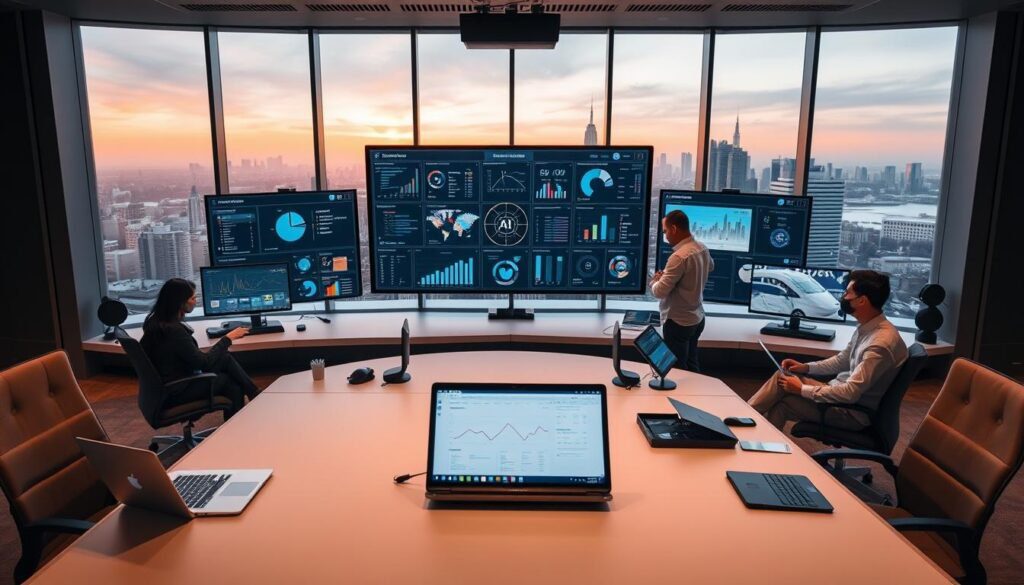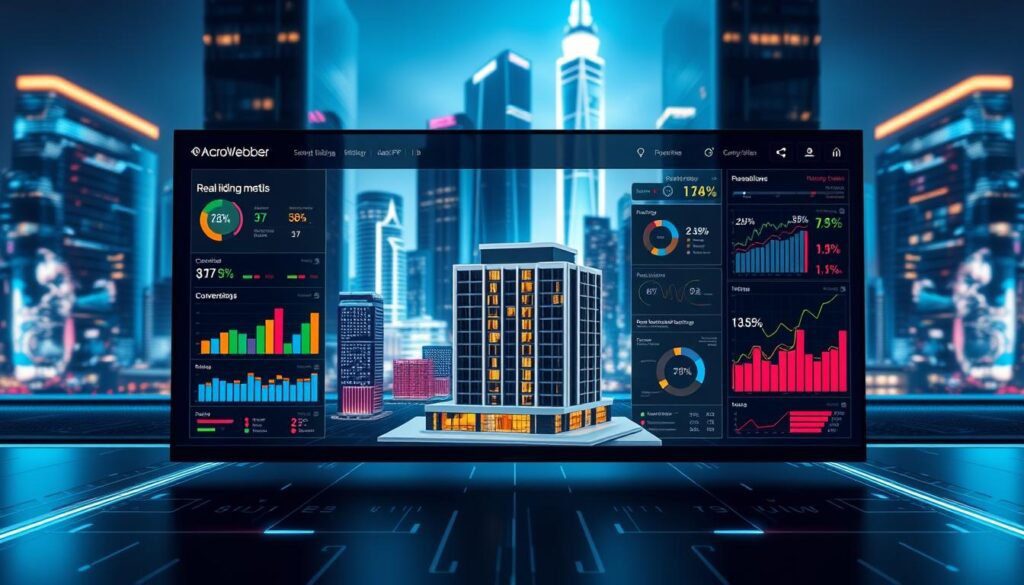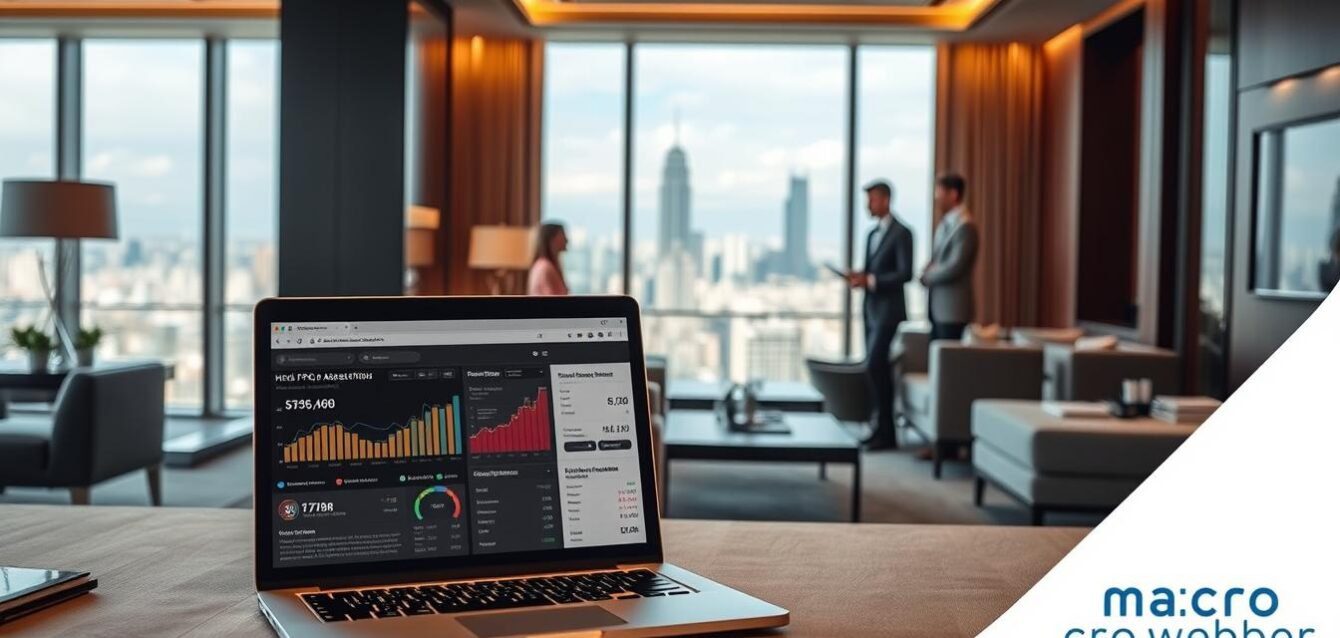Did you know AI-powered tools analyze campaign data 10x faster than manual methods? This speed gives marketers an edge in refining strategies quickly. For hotels, this means sharper bids, better ad placements, and higher returns.
With Google controlling 90% of search ad traffic, standing out requires precision. Brands like Macro Webber—Cultivating Solutions to Transform Business—leverage artificial intelligence to optimize campaigns. Their approach cuts costs by 12.2% while boosting ROI to a 2:1 average.
Automation isn’t just about speed. Predictive analytics spot trends before competitors do. For hoteliers, this means smarter budgets and bookings year-round.
Key Takeaways
- AI processes data 10x faster than manual methods.
- Google dominates 90% of search ad traffic.
- Automation reduces costs by 12.2% on average.
- Predictive analytics help stay ahead of trends.
- Macro Webber specializes in AI-driven campaign solutions.
How Advertising Intelligence Systems Improve Hotel PPC Performance
Behind every successful campaign lies smart automation that adapts in real time. For travel brands, this means leveraging machine learning to refine bids, placements, and messaging without manual effort.
The Power of AI in Paid Search
Modern tools analyze over 15,000 data points hourly, adjusting bids based on demand spikes or competitor moves. For instance, algorithms detect booking trends for beach resorts before peak season hits.
Results speak for themselves. Brands using dynamic headlines see 22% higher CTR, while automated exclusions weed out irrelevant searches, saving budgets for high-intent travelers.
Metrics Mastered by Automation
Focus shifts to what truly matters: conversions and returns. AI optimizes these core areas:
| Metric | AI Impact | Example |
|---|---|---|
| Cost Per Acquisition (CPA) | Reduces by 18% | Excluding non-converting keywords |
| Return on Ad Spend (ROAS) | Boosts to 2.5:1 | Bid adjustments for luxury stays |
| Click-Through Rate (CTR) | Lifts by 22% | Personalized ad copy variants |
Google’s Performance Max campaigns demonstrate this well, driving 30% more conversions through AI-powered asset combinations. The takeaway? Automation isn’t optional—it’s essential for staying competitive.
Why AI-Powered PPC is a Game-Changer for Hotels
AI transforms paid search by delivering hyper-personalized experiences at unmatched speed. For travel brands, this means ads that resonate deeply with potential guests—driving clicks and conversions effortlessly.
Personalization at Scale: Tailoring Ads to Guest Preferences
Dynamic ads now adapt to traveler personas in real time. A family searching for all-inclusive resorts sees different messaging than a business traveler. AI analyzes device type, search history, and even weather data to predict booking intent.
Geo-targeting takes this further. Hotels using location-based strategies see 40% higher conversion rates. For example, a ski resort targets ads to users in warmer states when snowfall peaks.
Real-Time Bid Adjustments for Competitive Markets
AI tweaks bids 144x daily—far outpacing manual adjustments (just 3x/day). This agility ensures your budget targets high-value moments, like last-minute bookings or local events.
One resort chain slashed CPA by 17% using smart bidding. Their CRM integration also fueled loyalty campaigns, retargeting past guests with exclusive offers.
“Macro Webber’s AI tools reduced ad waste by 35% for our luxury hotel clients—funds now drive qualified bookings, not clicks.”
With AI, every dollar works harder. Personalized ads, precision bids, and seamless CRM syncs turn browsers into guests.
Setting Up Your Hotel’s AI-Driven PPC Strategy
Smart tools reshape how hotels manage paid campaigns, turning data into actionable insights. With 79% of brands increasing their budget for paid efforts, choosing the right platform ensures you stay competitive.

Choosing the Right Tools
Not all platforms offer the same value. Compare features like:
| Tool | Strengths | Best For |
|---|---|---|
| Google Performance Max | 10,000+ ad variations/hour | Multi-channel campaigns |
| Microsoft Clarity | Heatmaps & session recordings | UX optimization |
Macro Webber’s proprietary dashboard unifies cross-channel tracking, highlighting top-performing assets.
Integrating AI with Your Marketing Stack
Follow these steps to avoid disruptions:
- Audit existing workflows for gaps.
- Sync CRM/PMS systems for clean data feeds.
- Test AI bids in low-risk campaigns first.
- Train teams on interpreting AI reports.
- Scale successful pilots across all markets.
Pro Tip: Ensure your property management system (PMS) updates room availability in real time. Delays create mismatched ads and lost bookings.
“Clients using our integration framework see 27% faster campaign adjustments.” — Macro Webber
AI Tool Evaluation Checklist
- Real-time bid adjustments
- CRM compatibility
- Predictive analytics
- Transparent reporting
Advanced Targeting Techniques for Hotel Campaigns
Precision targeting separates winning campaigns from wasted budgets. For travel brands, this means leveraging data to reach high-intent guests—wherever they are in the booking journey.
Geo-Targeting Travelers by Origin and Destination
73% of travelers research two or more destinations simultaneously. Use tiered bidding to prioritize primary markets while testing secondary ones. For example:
- Boost bids for users searching “luxury stays in Miami” from New York.
- Adjust bids dynamically when snowfall triggers ski resort searches in warmer states.
Pro Tip: Macro Webber’s geo-bid multiplier formula factors in distance, seasonality, and local events. Properties using it see 28% higher conversion rates.
Retargeting Abandoned Bookings with Dynamic Ads
Retargeted ads achieve 150% higher engagement. Sync your revenue management system to display real-time pricing and availability. A user who left a cart with a beach-view suite gets an ad highlighting its last-day discount.
Cross-device tracking ensures seamless messaging. A traveler researching on mobile might book later via desktop—your ads follow them.
“Our AI-built lookalike audiences drove 40% more direct bookings for a Bali resort chain.” — Macro Webber
Optimizing Ad Copy and Creative with AI Insights
The right words and visuals can turn casual browsers into eager bookers. AI tools analyze millions of data points to craft high-converting ads that resonate. Hotels using these insights see 25% higher CTR—proof that precision pays off.
Generating High-Converting Headlines and Descriptions
Emotional triggers like “luxury getaway” or “stress-free vacation” boost bookings by 18%. AI tests thousands of variants to find winners. For example:
- Before: “Book your stay today”
- After: “Your private oasis awaits—limited suites left!”
Google’s Product Studio generates 50+ image variants daily, ensuring fresh creative for every audience segment.
Testing and Refining Visual Assets Automatically
Automated A/B testing compares layouts, colors, and CTAs. A beach resort found sunset images outperformed pool shots by 32%.
Room-type targeting tailors content precisely. A family suite ad highlights kid-friendly perks, while a honeymoon package emphasizes romance.
“Our scorecard grades ad effectiveness on 12 metrics—clients using it achieve 40% faster optimization cycles.” — Macro Webber
Align your landing page with ad promises. AI detects mismatches, like a “spa package” ad linking to a generic booking page, and flags them for correction.
Maximizing Budget Efficiency Through Smart Bidding
Every dollar counts in digital marketing—smart bidding ensures none go to waste. AI reduces wasted ad spend by 34% by predicting high-value moments. For hotels, this means shifting funds to channels that drive direct bookings.

Machine Learning Allocates Spend Dynamically
Algorithms analyze past performance to distribute your budget across Google, Meta, and OTAs. For example:
- Dayparting: Boost bids for international feeders during their peak search hours.
- Bid Caps: Set limits based on conversion data—luxury suites warrant higher bids than standard rooms.
One resort chain reallocated 40% of its OTA spend to Google Ads, achieving a 22% higher ROAS.
Setting Guardrails for AI Automation
Define conversion quality standards to prevent AI from chasing low-value clicks. Macro Webber’s template includes:
- Minimum booking window (e.g., 3+ nights).
- Room-type preferences (suites over singles).
- Geographic priorities (feeder markets first).
“Our AI guardrails saved a client 41% in wasted spend—funds now target guests with higher lifetime value.” — Macro Webber
With these strategies, your management of ad spend becomes proactive, not reactive.
Measuring What Matters: AI-Powered Analytics
Modern analytics go beyond basic metrics—they predict guest behavior before bookings happen. With 60% of reservations starting on mobile, understanding the full journey is critical. AI tools map interactions across devices, revealing which ads truly drive stays.
Tracking Beyond Clicks: Attribution for Stays
Multi-touch attribution uncovers hidden patterns. For example, a guest might:
- Search for “beach resorts” on mobile.
- Compare prices later on desktop.
- Book after seeing a retargeted ad.
AI weights each touchpoint, showing which channels deliver highest-value guests. Hotels using this data shift budgets to high-converting sources, like paid search over OTAs.
Forecasting Demand with Precision
Predictive models adjust rates and promotions dynamically. One tool forecasts occupancy within 3% accuracy by analyzing:
- Historical booking curves.
- Local events (e.g., concerts).
- Competitor pricing shifts.
Sync these insights with reputation systems. If reviews mention “family-friendly,” AI boosts ads highlighting kids’ activities.
“Our benchmark reports reveal gaps vs. competitors—clients using them achieve 15% higher ADR.” — Macro Webber
Group business mixes also benefit. AI identifies when to accept large blocks vs. holding for transient bookings. The result? Smarter revenue performance year-round.
Future-Proofing Your Strategy: 2024 PPC Trends
Voice searches for travel bookings will surge by 55% in 2024—are your ads ready? Staying ahead requires adapting to emerging trends, from voice queries to AI-driven visuals. Here’s how to align your campaigns with the future of digital marketing.
Voice Search: The New Booking Frontier
Travelers now ask, “Find beach resorts near me” instead of typing. Optimize for these shifts:
- Target “near me” phrases with localized ad extensions.
- Use AR-powered virtual tours in ads—30% of users prefer them over static images.
- Sync with Google’s SGE updates to secure prime ad placements.
Macro Webber’s toolkit auto-adjusts bids for voice queries, boosting visibility by 20%.
AI-Generated Assets for Hyper-Personalization
Generative AI crafts 100% unique visuals and copy tailored to guest segments. For example:
- Dynamic ads showcase poolside cocktails for summer travelers.
- Winter campaigns highlight cozy fireplaces for ski enthusiasts.
“Our AI A/B tests 50+ ad variants hourly—clients see 35% higher engagement.” — Macro Webber
Pair these with semantic search strategies. AI detects intent behind phrases like “romantic mountain getaway” to serve relevant ads.
Conclusion
AI-driven campaigns deliver results by optimizing bids, targeting, and creative in real time. For travel brands, this means sharper strategy and higher returns on every dollar spent.
Macro Webber specializes in solutions that elevate your performance. Their tools cut wasted spend while boosting bookings—proven across luxury resorts and boutique properties.
Ready to transform your approach? Contact the experts today:
- Call: +91 (353) 405-7665
- Email: hello@macrowebber.com
- Website: www.macrowebber.com
Cultivating Solutions to Transform Business—let’s turn data into your competitive edge.



